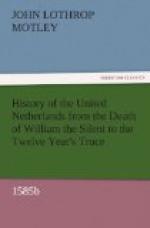A great dockyard and arsenal suddenly revealed themselves—rising like an exhalation—where ship-builders, armourers, blacksmiths, joiners, carpenters, caulkers, gravers, were hard at work all day long. The din and hum of what seemed a peaceful industry were unceasing. From Kalloo, Parma dug a canal twelve miles long to a place called Steeken, hundreds of pioneers being kept constantly at work with pick and spade till it was completed. Through this artificial channel—so soon as Ghent and Dendermonde had fallen—came floats of timber, fleets of boats laden with provisions of life and munitions of death, building-materials, and every other requisite for the great undertaking, all to be disembarked at Kalloo. The object was a temporary and destructive one, but it remains a monument of the great general’s energy and a useful public improvement. The amelioration of the fenny and barren soil, called the Waesland, is dated from that epoch; and the spot in Europe which is the most prolific, and which nourishes the largest proportion of inhabitants to the square mile, is precisely the long dreary swamp which the Prince thus drained for military purposes, and converted into a garden. Drusus and Corbulo, in the days of the Roman Empire, had done the same good service for their barbarian foes.
At Kalloo itself, all the shipwrights, cutlers, masons, brass-founders, rope-makers, anchor-forgers, sailors, boatmen, of Flanders and Brabant, with a herd of bakers, brewers, and butchers, were congregated by express order of Parma. In the little church itself the main workshop was established, and all day long, week after week, month after month, the sound of saw and hammer, adze and plane, the rattle of machinery, the cry of sentinels, the cheers of mariners, resounded, where but lately had been heard nothing save the drowsy homily and the devout hymn of rustic worship.
Nevertheless the summer and autumn wore on, and still the bridge was hardly commenced. The navigation of the river—although impeded and rendered dangerous by the forts which Parma held along the banks—was still open; and, so long as the price of corn in Antwerp remained three or four times as high as the sum for which it could be purchased in Holland and Zeeland, there were plenty of daredevil skippers ready to bring cargoes. Fleets of fly-boats, convoyed by armed vessels, were perpetually running the gauntlet. Sharp actions on shore between the forts of the patriots and those of Parma, which were all intermingled promiscuously along the banks, and amphibious and most bloody encounters on ship-board, dyke, and in the stream itself, between the wild Zeelanders and the fierce pikemen of Italy and Spain, were of repeated occurrence. Many a lagging craft fell into the enemy’s hands, when, as a matter of course, the men, women, and children, on board, were horribly mutilated by the Spaniards, and were then sent drifting in their boat with the tide—their arms, legs, and ears lopped off up to the city, in order that—the dangerous nature of this provision-trade might be fully illustrated.




